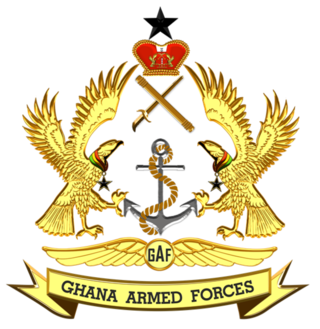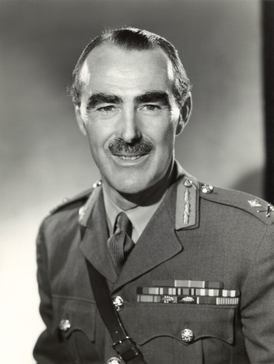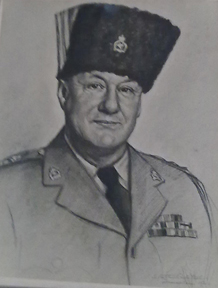Related Research Articles

The Ghana Armed Forces (GAF) is the unified armed force of Ghana, consisting of the Army (GA), Navy (GN), and Ghana Air Force.

Joseph Arthur Ankrah was a Ghanaian army general who was head of state of Ghana from 1966 to 1969 as Chairman of the National Liberation Council. He was Ghana's first military head of state. Ankrah also served as Chairperson of the Organisation of African Unity from 24 February 1966 to 5 November 1966. Previously, Ankrah was appointed the first commander of the Ghana Army in 1961.
Lieutenant General Akwasi Amankwaa Afrifa was a Ghanaian soldier, farmer, traditional ruler and politician. He was the head of state of Ghana and leader of the military government in 1969 and then chairman of the Presidential Commission between 1969 and 1970. He continued as a farmer and political activist. He was elected a member of Parliament in 1979, but he was executed before he could take his seat. He was executed together with two other former heads of state, General Kutu Acheampong and General Fred Akuffo, and five other generals, in June 1979. He was also popularly referred to by his title Okatakyie Akwasi Amankwaa Afrifa and was in addition the abakomahene of Krobo in the Asante-Mampong Traditional Area of the Ashanti Region of Ghana.
Major General Nathan Apea Aferi was a soldier and politician in Ghana. He was a former Chief of the Defence Staff of Ghana. He also served briefly as Foreign Minister of Ghana.
John Ebenezer Samuel de Graft-Hayford (1912–2002) was Ghana's first Ghanaian Chief of Air Staff. He became the first indigenous Air Force Commander in Ghana and Black Sub-Saharan Africa. He was also acting Chief of Defence Staff (CDS) for a brief period in 1962.

The Ghana Army is the principal land warfare force of Ghana. In 1959, two years after the Gold Coast became independent from the British Empire, the Gold Coast Regiment was withdrawn from the Royal West African Frontier Force and formed the basis for the new Ghanaian army. Together with the Ghana Air Force and Ghana Navy, the Ghana Army makes up the Ghana Armed Forces, which is controlled by the Ghanaian Ministry of Defence and Central Defence Headquarters, both of which are located in the Greater Accra Region.

Lieutenant-General Emmanuel Kwasi Kotoka Born was a Ghanaian military officer who was a member of the ruling National Liberation Council which came to power in Ghana in a military coup d'état on 24 February 1966. This overthrew the government of Dr. Kwame Nkrumah, the first president of the republic.

The National Liberation Council (NLC) led the Ghanaian government from 24 February 1966 to 1 October 1969. The body emerged from a coup d'état against the Nkrumah government carried out jointly by the Ghana Police Service and Ghana Armed Forces with collaboration from the Ghana Civil Service.

The Supreme Military Council (SMC) was the ruling government of Ghana from 9 October 1975 to 4 June 1979. Its chairman was Colonel I.K. Acheampong. He was also the Head of state of Ghana due to his chairmanship.

Major General Henry Templer Alexander, CB, CBE, DSO was a British Army officer who served as Chief of Defence Staff of the Ghana Armed Forces between 1960 and 1961.

The Chief of the Defence Staff (CDS) is the professional head of the Ghana Armed Forces. He is thus responsible for the administration and the operational control and command of the Ghana military. The CDS is a member of the Armed Forces Council. This council advice the President of Ghana on matters of policy relating to defence and also regulates the administration of the Armed Forces. It also advises the President on the promotion of all officers above the rank of Lieutenant-Colonel or its equivalent.

Major General Sir Victor Paley, KBE, CB, DSO, DL (1903–1976) was a British Army officer. In addition, he was seconded to the Ghana Army, to become the first Chief of the Defence Staff of the dominion of Ghana.
Major General Stephen Joseph Asamoa Otu was a former Chief of the Defence Staff of the Ghana Armed Forces. He was the first Ghanaian officer to serve in this capacity.
Major General Daniel K. Addo is a former Chief of the Defence Staff of the Ghana Armed Forces. He is a Ghanaian soldier and politician.
Major Courage Emmanuel Kobla Quashigah was a Ghanaian soldier and politician. He held many prominent positions in the Ghana Armed Forces and was a Minister of State for Agriculture and later Health in the NPP government of John Kufuor between 2001 and 2009.
Major Seth Kobla Anthony was a Ghanaian soldier and diplomat. He was the first black African-born soldier to be commissioned as an officer in the British Army.
Ferdinand Kwasi Fiawoo was a Ghanaian religious minister, playwright and educator, founder of Zion College, the first secondary school in Ghana's Volta Region.
Daniel Ahmling Chapman Nyaho was a Ghanaian statesman, diplomat and academic. He was the first African appointee at the United Nations. He served as the Secretary to the cabinet in the first Convention People's Party government which shared the colony's administration with the colonial government. He also served as Ghana's ambassador to the United States of America and Ghana's permanent representative to the United Nations. In 1958, he became the first Ghanaian headmaster of Achimota College.
Michel Camp is the base of the First Battalion of Infantry of the Ghana Army. It is located at Tema in the Greater Accra Region of Ghana. The First Battalion together with the Second and Fifth Battalions of Infantry make up the Southern Command of the Ghana Army.
William Adjei Thompson was a Ghanaian soldier and politician. He was the Greater Accra Regional Commissioner from 1975 to 1977, the Regional Commissioner for the Brong Ahafo Region from 1977 to 1978, and the Central Regional Commissioner from 1978 to June 1979. In 1985, he was reappointed Greater Accra Regional Minister and in 1986, appointed Regional Secretary for the Western Region. He remained in this position until April 1988 when he was made Greater Accra Regional Minister for a third time. He served in this capacity until 1991.
References
- ↑ "West African Forces" (PDF). Second Supplement to the London Gazette of Friday 24th November. The Stationery Office under the superintendence of Her Majesty's Stationery Office (HMSO), part of The National Archives. 65 (39077): 5941. 28 November 1950. Retrieved 26 June 2020.
- ↑ "Negro Army Officer to join British Royal Household". JET. 16 (10): 24. 2 July 1959. ISSN 0021-5996 . Retrieved 26 June 2020.
- ↑ "(Title not available at time of writing)". The Guardian. London. 17 June 1959. Retrieved 26 June 2020.
- ↑ Ghana Gazette No. 30; Accra; 6 June 1961